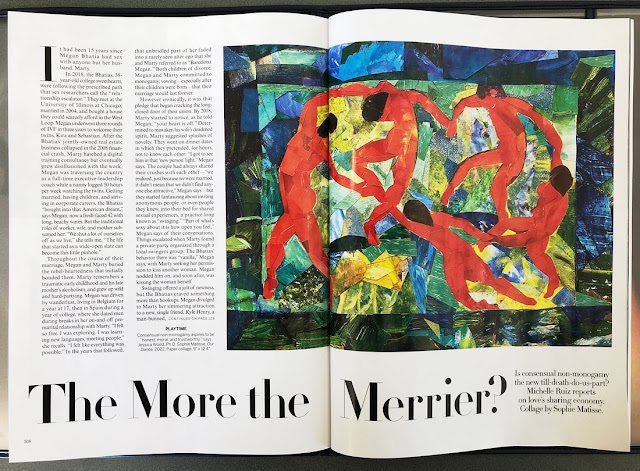Vogue tells our story well. So do others in the last few days.
The experience felt transformative: “It was like reigniting the curiosity of a teenager,” Megan remembers. Questioning the confines of her marriage “was like coming into Technicolor,” she marvels, referencing the movie Pleasantville, in which rainbow hues begin to populate a puritanical, black-and-white town. Megan was alive with excitement and energy; she describes the feeling of returning to her body, as if she’d been previously numb. “I remember looking back at them at one point, and both of them looking at me,” she says of that first encounter. “It was like, Oh my God, this whole other world is out here.”Opening their relationship sparked a stream of existential questions for them, according to Megan: “Whose life are we living? What do we want?” Entrenched systems were equally open to debate. “We are in a time of questioning institutional structures like health care, education, and, yes, monogamy,” she says....“I think people are disillusioned with life right now and really starting to write their own rules.”...In contrast to the free love of the ’60s or suburban key-party ethos of the ’70s, consensual non-monogamy in 2022 is a thoughtfully considered, typically therapized practice, complete with a tidy acronym. CNM is rooted in open relationships that aspire to be “honest, moral, and trustworthy,” says Jessica Wood, Ph.D., a sexuality and relationships researcher....
Sex scholars studying CNM are beginning to explore the possibility that the desire to be non-monogamous is a “relationship orientation” unto itself, or may be part of sexual orientation. Creating a more nuanced definition of sexual orientation could mean asking: “Do you want no partners, or do you want to be exclusive in sexual and/or emotional ways to one partner, or open with multiple?” Moors says. As with gender and sexuality, relationships can exist on a spectrum, Vrangalova argues. “We’re not dealing with a binary world of ‘Oh, you’re monogamous,’ or ‘You’re totally open.’ There’s lots of different things in between.”---------------------------------------...Megan considers herself a better parent now that she’s polyamorous, saying she’s a more loving person in general. She and Marty give their son and daughter an age-appropriate explanation of their unconventional relationship structure or “polycule” (CNM is only the beginning of a seemingly endless glossary of terms). “At one point, when we lived in New Zealand and Kyle lived with us for about six months, they knew I might be in Kyle’s bedroom or I might be in Daddy’s bedroom,” Megan said. “We talk about ‘Mommy loves Kyle and Daddy,’ and ‘Daddy loves Mommy and Daddy loves his partner’…and they don’t know it’s not normal yet.”----------------------------------...“This is the next wave of inquiry,” Moors agrees. “This is going to be up for national discussion in the coming decade, if not sooner.” It all amounts to a migration to the mainstream: At [Janet] Hardy and coauthor Dossie Easton’s earliest book events for The Ethical Slut, in the late ’90s, “audiences were mostly geek culture—Renaissance Fair, science-fiction conference attendees, old hippies like us,” Hardy said. Now, the crowds are much more diverse. ......Joli Hamilton, Ph.D., a research psychologist, told me CNM is about “returning agency” to your partner. She and her second husband, Ken, who have seven children between them, live in small-town Massachusetts. They “look like soccer parents,” she says....
Reading my full quote from the @voguemagazine article "The More the Merrier: Is Monogamy Over?" by Michelle Ruiz Andrews. #koecreation pic.twitter.com/wq0hl8AU04
— Koe Creation (They/Them) (@Koecreation) March 31, 2022
● In other big media: the World Service of BBC News broadcast a 23-minute radio program last Sunday titled Divisible Love, part of its "Deeply Human" series (April 3). It's worth a listen in your drive time. Webpage description:
Why do you love the way you do?We're expected to love only one romantic partner at a time. But we can love more than one parent, sibling, and friend - so why do so many cultures demand monogamy in romance? Is it time to reconsider the old model?Dessa speaks with a philosopher, an economist, and sexpert Dan Savage to talk about love, sex, and commitment.
● Google Alerts doesn't serve up as many small-town newspaper profiles of local out-and-proud polyfamilies as it did a decade ago, perhaps because there are ever fewer small-town newspapers. But the genre continues. This appeared in The Gabber of Gulfport, Florida: Meet Gulfport’s Polyamorous Throuple (April 1)

Rachael Meir, Aaron Meir, and Kasey Kershne (Ran & Rami Photography)
By Abby BakerWhen Rachael and Aaron Meir met in college in Colorado 20 years ago, their future seemed on track for children, the white picket fence, and everything that comes with it.Until they took the time to talk about what they wanted....Today, the Meir’s are in a polyamorous triad relationship with Kasey Kershne. The group moved from Colorado to Gulfport three months ago....Despite the Meir’s being together for nearly two decades, their relationship with Kershne is an equal one. That’s the entire idea behind ethical polyamory, says Rachael, a licensed psychologist.The three have separate dynamics with one another, each with their own relationship within the triad, as well as a dynamic as a group. They go on dates, scooter around town, have disagreements, triple spoon, and live a normal life like traditional couples.The triad cites warm weather and lower cost of living in their decision to move from Colorado to Florida, despite Colorado having a sizable polyamorous community.Florida, not so much.“A lot of Florida isn’t friendly for our situation,” Aaron said.Despite this, they traveled the state searching for a potential home, and settled on Gulfport.... The three of them have posted their polyamorous status on various Gulfport Facebook groups and received overwhelmingly positive responses.Well, not all positive, Aaron says. But for the most part, people have been understanding and [shown] willingness to learn.“The idea of being able to walk down the street and all be holding hands … we didn’t want to hide ourselves for any reason,” Kershne said....“We did a lot of research on triads and ethical polyamory and how to do it in a way that didn’t make someone feel like they are a third, or disposable,” Rachael said....“In a lot of cases, people are still living in the shadows,” Kershne said. ... But with the changing nature of societal norms, perhaps it’s not off the table.Find out more about the throuple on their TikTok and Instagram @triadandtrue.
Unexpected relationship insights from the world ofethical non-monogamy.
By Sian BennettUntil a couple of years ago, I didn’t think much about ethical non-monogamy (ENM). ... But after spending time with friends from diverse cultural backgrounds who are exploring non-traditional relationships, I’ve gained a deeper understanding of why ethical non-monogamy is an attractive option for them....During one of our get-togethers, it transpired that she was exploring polyamory.I was fascinated. But I also had so many questions about its practical application. Like, how does it work? Don’t you get jealous? How many people can you date at the same time? What do you tell family or friends?Through my new friend, I met more people exploring this lifestyle choice. Then I started noticing it almost everywhere. ...I clicked with people in this community because they were open-minded, non-judgmental, intelligent, respectful, interesting and inclusive. ... I became a poly-ally.One of my first observations was that to navigate this lifestyle successfully, you must be prepared to work — on yourself, your communication, your emotional regulation and on owning your s**t. What a radical idea.One of the things that attracted me to go deeper was the awareness and discussion around consent — in all its forms.At its essence, consent is about boundaries. It’s about checking in with what feels OK for you and knowing how to communicate that....The people I’ve met are less caught up in the script of what life “should” look like. I celebrate that. ... Breaking down programming as to why things need to be a certain way can be a challenge.
...A community often becomes like a family, or tribe, due to the shared values....One of the biggest takeaways from my time in Polyland is the amount of clear, honest communication that’s required to manage multiple relationships successfully.Heck, having one successful relationship is something to celebrate. So then double that, add a few dates, plus a job, friends and other commitments… I feel tired just writing this....One approach that many people swear by is Nonviolent Communication. It’s a great resource for anyone that wants to communicate with their partner in a healthier way....Another key takeaway from the polyamorous lifestyle is that each relationship provides something different. And that’s one of the main reasons people choose it....For the monogamous among us, I hope this has given you something to ponder, whether you choose to explore a different way of relating or not.
Don't miss Polyamory in the News!
SUBSCRIBE by a feed, or
SUBSCRIBE by email
_________________________
[Permalink]
Labels: #Poly101, #polyactivism, #PolyamoryNews, #PolyintheMedia, UK, Ukraine




0 Comments:
Post a Comment
<< Home